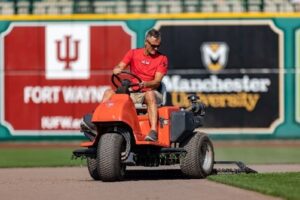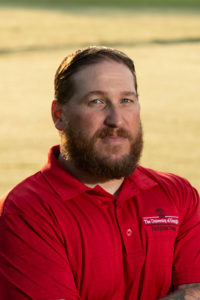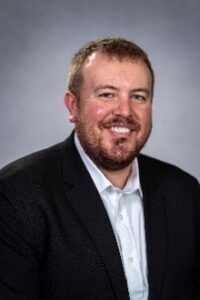The SFMA Conference Education Committee has put together an exciting and informative education program for the 2024 Conference in Daytona Beach, Florida. Each month, speakers will be featured to highlight a sample of what will be offered to attendees at the conference. This month’s featured speakers are Keith Winter, Gerald Henry, Ph.D., and Erick Begitschke.
 Keith Winter completed his 17th year in professional baseball in 2023, and his 14th as the head groundskeeper for the Fort Wayne TinCaps at Parkview Field. After spending 25 years as a television broadcaster, Winter has won four national awards for field excellence, including the SFMA Professional Baseball Field of the Year. As a member of the Sports Field Manager’s Association since 2008, Keith has served on the organization’s Education Committee, and is one of the leaders of the Minor League Baseball (MiLB) Groundskeepers Symposium. This fall, a complete 1.2-million-dollar renovation of Parkview Field was completed to meet Major League Baseball’s field compliance requirements. A task that will go down as Winter’s greatest achievement as a sports field manager. Keith will be presenting, “Starting From Scratch- Complete MiLB Field Renovation.”
Keith Winter completed his 17th year in professional baseball in 2023, and his 14th as the head groundskeeper for the Fort Wayne TinCaps at Parkview Field. After spending 25 years as a television broadcaster, Winter has won four national awards for field excellence, including the SFMA Professional Baseball Field of the Year. As a member of the Sports Field Manager’s Association since 2008, Keith has served on the organization’s Education Committee, and is one of the leaders of the Minor League Baseball (MiLB) Groundskeepers Symposium. This fall, a complete 1.2-million-dollar renovation of Parkview Field was completed to meet Major League Baseball’s field compliance requirements. A task that will go down as Winter’s greatest achievement as a sports field manager. Keith will be presenting, “Starting From Scratch- Complete MiLB Field Renovation.”
With Major League Baseball (MLB) requiring a field audit of all 120 Professional Development License (PDL) minor league teams, fields that do not meet the established criteria must come into compliance by the 2025 season. Parkview Field, home of the Fort Wayne TinCaps, Class A affiliate of the San Diego Padres, undertook a complete renovation in the fall of 2023 to meet all future requirements. This presentation will offer insight into this extensive project.
Learning Outcomes

 Dr. Gerald Henry (left) is the Athletic Association Endowed Professor of Environmental Turfgrass Science at the University of Georgia. He earned a BS and MS in Plant Science and Plant Biology from Rutgers University and a Ph.D. in Crop Science from North Carolina State University. He is the director of the Athens Turfgrass Research and Education Center, the Undergraduate Coordinator for the Department of Crop and Soil Sciences, and the director of the UGA Turfgrass Management program.
Dr. Gerald Henry (left) is the Athletic Association Endowed Professor of Environmental Turfgrass Science at the University of Georgia. He earned a BS and MS in Plant Science and Plant Biology from Rutgers University and a Ph.D. in Crop Science from North Carolina State University. He is the director of the Athens Turfgrass Research and Education Center, the Undergraduate Coordinator for the Department of Crop and Soil Sciences, and the director of the UGA Turfgrass Management program.
Erick Begitschke (right) is a second year Ph.D. student at the University of Georgia under the direction of Dr. Gerald Henry. He received his bachelors in Turfgrass Management at UGA in 2015 and went on to complete a masters in turfgrass weed science at Mississippi State University in 2017. Erick worked as a research associate for SePRO Corporation in Whitakers, NC prior to beginning his Ph.D. at UGA.
Dr. Henry and Erick will be presenting, “New Approaches for Testing Sports Field Safety and Performance.”
Safety and performance are at the forefront of sports field management. Previous performance testing methods have relied on hand-held sensors to describe field characteristics like surface hardness, soil compaction, and traction. New research has aimed at utilizing athletes with wearable sensors to more accurately describe “real-time” interactions between players and field attributes both in the lab and in the field.
Learning Outcomes